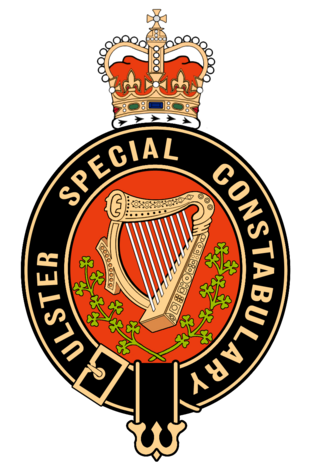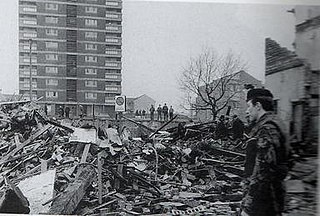Related Research Articles

The Royal Ulster Constabulary (RUC) was the police force in Northern Ireland from 1922 to 2001. It was founded on 1 June 1922 as a successor to the Royal Irish Constabulary (RIC) following the partition of Ireland. At its peak the force had around 8,500 officers, with a further 4,500 who were members of the RUC Reserve.

The Royal Irish Constabulary was the police force in Ireland from 1822 until 1922, when all of the island was part of the United Kingdom. A separate civic police force, the unarmed Dublin Metropolitan Police (DMP), patrolled the capital and parts of County Wicklow, while the cities of Derry and Belfast, originally with their own police forces, later had special divisions within the RIC. For most of its history, the ethnic and religious makeup of the RIC broadly matched that of the Irish population, although Anglo-Irish Protestants were overrepresented among its senior officers.
The George Cross (GC) is the highest award bestowed by the British government for non-operational gallantry or gallantry not in the presence of an enemy. In the British honours system, the George Cross, since its introduction in 1940, has been equal in stature to the Victoria Cross, the highest military award for valour. It is awarded "for acts of the greatest heroism or for most conspicuous courage in circumstance of extreme danger", not in the presence of the enemy, to members of the British armed forces and to British civilians. Posthumous awards have been allowed since it was instituted. It was previously awarded to residents of Commonwealth countries, most of which have since established their own honours systems and no longer recommend British honours. It may be awarded to a person of any military rank in any service and to civilians including police, emergency services and merchant seamen. Many of the awards have been personally presented by the British monarch to recipients or, in the case of posthumous awards, to next of kin. The investitures are usually held at Buckingham Palace.

The Ulster Special Constabulary was a quasi-military reserve special constable police force in what would later become Northern Ireland. It was set up in October 1920, shortly before the partition of Ireland. The USC was an armed corps, organised partially on military lines and called out in times of emergency, such as war or insurgency. It performed this role most notably in the early 1920s during the Irish War of Independence and the 1956–1962 IRA Border Campaign.

PSNI Football Club is an intermediate Northern Irish football club that plays in the Mid-Ulster Football League Intermediate A division. The club is associated with the Police Service of Northern Ireland, and its home ground is Newforge Lane in Belfast.
The following outline is provided as an overview of and topical guide to the Troubles.

On 4 December 1971, the Ulster Volunteer Force (UVF), an Ulster loyalist paramilitary group, detonated a bomb at McGurk's Bar in Belfast, Northern Ireland, frequented by Irish Catholics–nationalists. The explosion caused the building to collapse, killing fifteen Catholic civilians—including two children—and wounding seventeen more. It was the deadliest attack in Belfast during the Troubles.
Major James Matthew Stronge was a soldier and Ulster Unionist Party MP in the Parliament of Northern Ireland, and the later Northern Ireland Assembly. He was the son and heir of Sir Norman Stronge, Bt; they were both killed by the Provisional Irish Republican Army at his family home, Tynan Abbey.

The Special Patrol Group (SPG) of the Royal Ulster Constabulary was a tactical reserve of 310 officers which had the role: "to provide support to divisional policing both uniform and CID, to police interface areas at times of civil unrest, and to do so in a disciplined way. The Special Patrol Group was preceded by the Reserve Force, the name was changed to Special Patrol Group in 1970 to mirror the introduction of the Metropolitan Special Patrol Group and to avoid confusion between the Reserve Force and the newly formed RUC Reserve.
This is a description of law enforcement in Northern Ireland and the Republic of Ireland. Before the Republic left the union in 1922, one police force — the Royal Irish Constabulary — policed almost the whole island.

John William Nixon, MBE, was a unionist politician and police leader in Northern Ireland who was alleged to be responsible for several sectarian atrocities, including the McMahon killings and the Arnon Street killings. It was widely believed that Nixons "murder gang" within the Royal Irish Constabulary (RIC) hunted down and murdered Catholics as reprisals for the killing of police.

James Gamble, is a British former police officer and head of Belfast region for the now disbanded RUC Special Branch.

Judith Kyle Gillespie, CBE is a retired senior police officer. She was the Deputy Chief Constable of the Police Service of Northern Ireland between June 2009 and March 2014.

Gladys Maccabe, MBE HRUAFRSA MA(Hons)ROI was a Northern Irish artist, journalist and founder of The Ulster Society of Women Artists.
John Oliver Weir is an Ulster loyalist born and raised in the Republic of Ireland. He served as an officer in Northern Ireland's Royal Ulster Constabulary's (RUC) Special Patrol Group (SPG), and was a volunteer in the illegal Ulster Volunteer Force (UVF). As a member of the UVF's Mid-Ulster Brigade led by Robin "the Jackal" Jackson, Weir was a part of the Glenanne gang, a group of loyalist extremists that carried out sectarian attacks mainly in the County Armagh area in the mid-1970s.
William Elliot was a Northern Irish loyalist and a leading member of the Red Hand Commando (RHC) paramilitary organisation. He fled Northern Ireland after being implicated in the brutal 1994 murder of an epileptic Protestant woman, Margaret Wright, who was beaten and shot inside a south Belfast loyalist bandhall in the mistaken belief that she was a Catholic or informant for the Royal Ulster Constabulary (RUC). For his part in the murder, Elliot was gunned down by members of his own organisation.
The Royal Ulster Constabulary Service Medal was a medal created to honour the service of members of the Royal Ulster Constabulary (RUC) and the RUC Reserve. Established in 1982 and first awarded in 1985, the medal ceased to be awarded when the RUC was replaced by the Police Service of Northern Ireland.
Sir Robert Edward Graham Shillington CBE was a senior Northern Irish police officer. He served as Chief Constable of Royal Ulster Constabulary from 1970 to 1973.
On 11 August 1970, two Royal Ulster Constabulary (RUC) officers were killed by a booby-trap bomb planted under a car by the Provisional Irish Republican Army (IRA) near Crossmaglen, in County Armagh, Northern Ireland. They were the first RUC officers to be killed by republicans during the Troubles and the first security forces to be killed in South Armagh, an IRA stronghold for much of the conflict.
The Red Lion Pub bombing was a bomb attack on 2 November 1971 in Belfast, Northern Ireland. Planted by the Provisional IRA, it exploded in the Red Lion pub on Ormeau Road, killing three people and injuring about 30 others. The IRA members had given customers less than ten seconds to flee the building. Police said the target was the neighbouring Royal Ulster Constabulary (RUC) station.
References
- 1 2 3 'A BIG CHALLENGE FOR NEW WOMAN RU.C. CHIEF', Belfast News-Letter , 3 September 1965, page 5
- 1 2 3 'TOP R.U.C. POST FOR BELFAST WOMAN', Belfast News-Letter, 26 October 1965, page 1
- ↑ "Police Orders, 1934 (MEPO 7/96)". The National Archives.
- ↑ Cameron, M. (1993). The Women in Green: A history of the Royal Ulster Constabulary's Policewomen. Belfast: RUC Historical Society, page 20
- ↑ Cameron, M. (1993). The Women in Green: A history of the Royal Ulster Constabulary's Policewomen. Belfast: RUC Historical Society, page 25
- ↑ "The Belfast Gazette, 5 January 1951, page 2" (PDF).
- ↑ 'Honorary Degrees', Belfast Telegraph , 17 December 1964, page 8